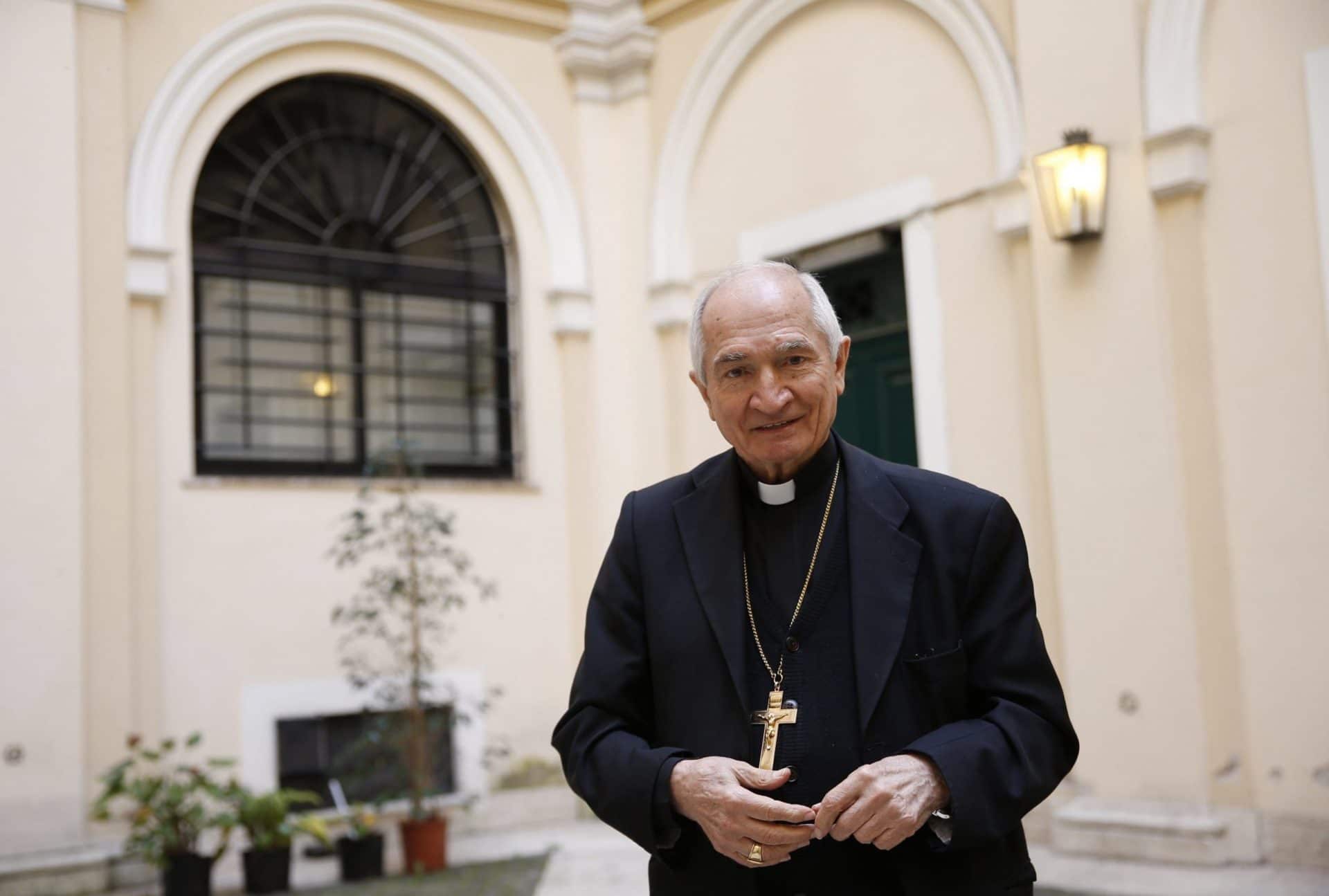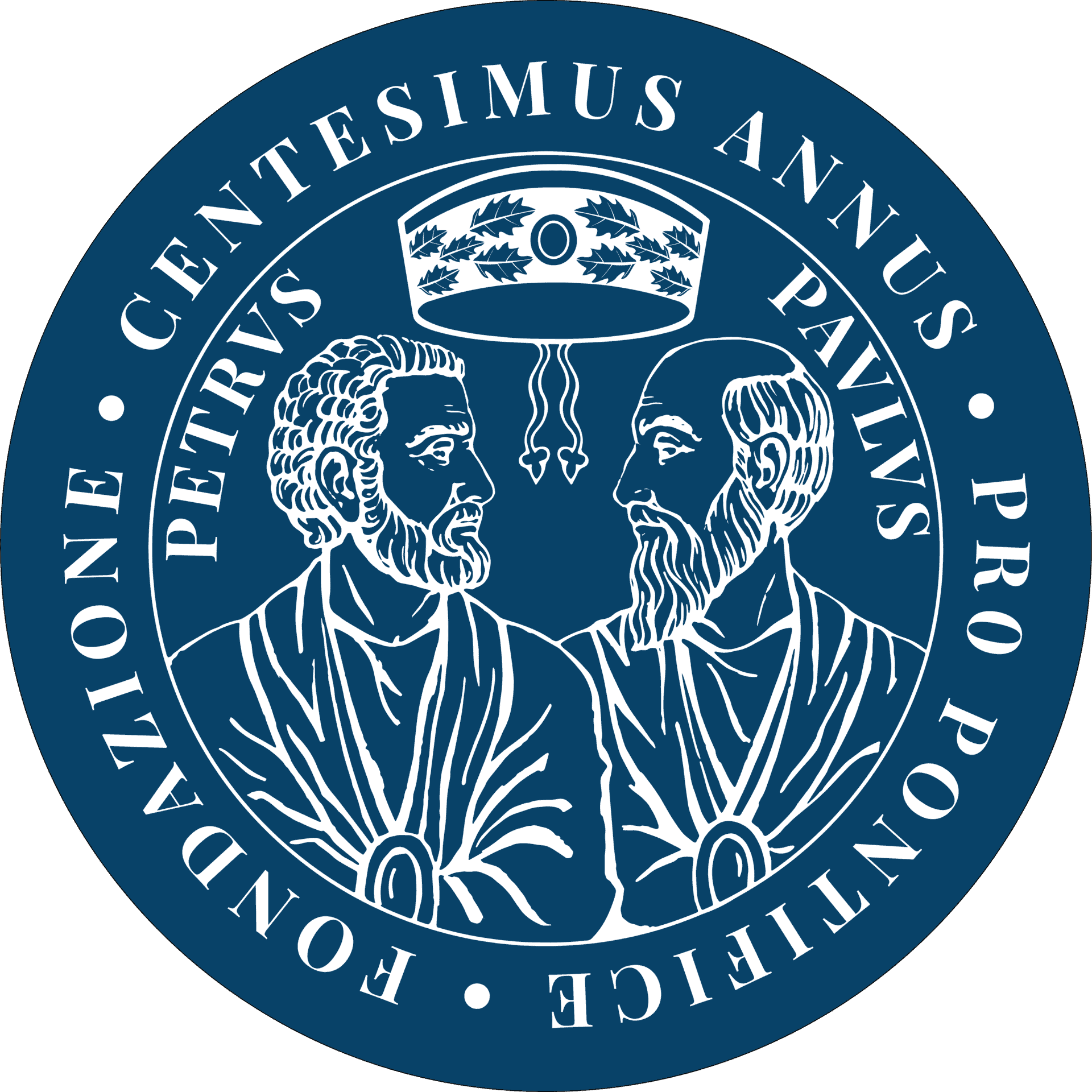Catholic Social Teaching: A New Methodology for a New Economy
Speech to Fondazione Centesimus Annus on the Occasion of Its
“Economy and society. International Award Ceremony”
Palazzo della Cancelleria, December 16, 2021
Silvano Cardinal Tomasi C.S.

Cardinal Tomasi Silvano
Greetings and thank you.
We are meeting at an auspicious moment, with two particular reasons to pause and reflect on the terms for a more human and moral economy. – First, there is a widespread understanding among business leaders and economic think-tanks that business will need to be radically different. Even before the Covid-19 pandemic, The World Bank and The World Economic Forum (among others) foresaw far-reaching structural changes to be imminent. – At the same time, the Church has embarked on its global synod. Pope Francis calls this “the gift and task of journeying together” to “find in the trials” of these times “the reasons for re-founding the path of Christian and ecclesial life.”
This confluence creates a unique opportunity for reflection and dialogue: on the one hand, to rethink and influence the needed new economy with precepts from Catholic Social Teaching; and on the other to offer the talents of the Fondazione to the synodal process, especially in regards to Church governance, and management of people, assets, projects, and mission.
RECAST HOW WE READ THE SIGNS OF THE TIME
Since the Second Vatican Council, the Church has read the “signs of the times” with a three-fold process: – To see (which is to study the facts); – To judge (which is to apply moral, theological, and spiritual perspective); – And To act (which is to take those tangible steps to resolve the issue at hand).
In his book, Let Us Dream, Pope Francis evolves this methodology, recasting the three steps: first, to contemplate, (which is to engage the situation or issue affectively as well as intellectually); second, to 1 of 9 discern, (which is to allow the complexity and even contradictions of the reality to come into focus); and third, to propose (which is to foment solutions by inviting others to ponder and contribute to the desired outcomes).
Pope Francis’ methodology is important because it allows us to engage the current situation in its fuller complexity. With this presentation, I will use his methodology to help us draw out some insights — and inspiration — from the unique moment we face.
A) CONTEMPLATE
As all of you well know, there is much to contemplate – a tsunami of issues and contradictory needs. To be clear, while analysis involves studying facts and implications, contemplation requires that we immerse ourselves in the world, engaging with our hearts the world’s suffering and hopes as well as its empirical data.
Experts who study the global economy are clear that our global economy is in the midst of an epochal change. The Harvard Business Review, The World Economic Forum, and the global consultancy McKinsey, are among those prescribing far-reaching new leadership styles and management approaches for what they call “The Fourth Industrial Revolution.”
This “revolution” is propelled by technology, including ever more pervasive Artificial Intelligence. However, these business thought leaders also acknowledge that this far- reaching change is imperative for social and ecological reasons. Extreme inequality has emerged as an inherent feature of the current economy. The unregulated rise of high leveraged, heavily concentrated, and often speculative financial markets has exacerbated social polarization. Financialization has, moreover, altered the behaviour of corporations in all sectors of the economy, with a turn away from ethics to more predatory business practices that prioritize profits over prosperity.
Pope Francis has been very clear about the systemic failures of the Neo-liberal approach. In Evangelii Gaudium from 2013, Pope Francis underscored “The need to resolve the structural causes of poverty 2 of 9 cannot be delayed, not only for the pragmatic reasons of its urgency for the good order of society, but because society needs to be cured of a sickness which is weakening and frustrating it, and which can only lead to new crises.” Later, developing his theme for “an integral 1 ecology” in Laudato Si’, the Pope lamented that “the opportunity to develop a new economy” in the aftermath of the global financial crisis of 2007-08 “did not include rethinking the outdated criteria which continue to rule the world.”2
With all the talk and principles for a “Fourth Industrial Revolution,” the consensus is now emerging among business leaders and institutional investors that the narrative which gives primacy to the free market has largely failed to deliver its promises. The ‘trickledown’ effects that justified ever-more aggressive self-interest have proven to be an illusion. Nevertheless, the relentless pressure to commodify work — and to reduce all human endeavour to a bottomline calculation — has, inevitably, spread to the environmental world. This has had devastating consequences for climate, for the natural commons, and for the poor who by far bear the harshest burden from pollution and ecological destruction.
Although economists and business people are increasingly aware of the need for great change, there is, as yet, little evidence that morality will be a factor in that transformation. Pope Francis observed that in the aftermath of the financial crisis, ethics were, in fact, viewed all too often “with a certain scornful derision.” While the Fourth Industrial 3 Revolution literature and consultancies talk about “more inclusive capitalism,” and insist on metrics for ESG (Environment, Society, Governance), no mention is ever made of the required moral conversion, with its urgent ethical dimensions.
This marginalization of ethics, and privatization of morality, has been underway since the first Industrial Revolution, which inspired Pope Leo XIII’s seminal encyclical Rerum Novalis. The task for us now is to 1 FRANCIS, Evangelii Gaudium, op. cit., 202. FRANCIS, Laudato Si’, op. cit., 189. 2 3 FRANCIS, Evangelii Gaudium, op. cit. 57 3 of 9 not allow the Fourth Industrial Revolution to repeat the dehumanization of previous models. The Covid-19 pandemic has not only increased inequality within countries. It has also upended budgets in many countries of the developing world. It will not be enough to implement the initiative by the G20 and the Paris Club to suspend bilateral debt service payments for a select number of vulnerable countries. A much more ambitious multilateral action on debt restructuring and relief is needed to generate the political and economic stability for truly integral development.
With your passion and skills, with your faith and solidarity, I entreat the Fondazione to work to ensure that the Fourth Industrial paradigm will be revolutionary for its humanizing aims and moral outcomes.

Catholic social teaching for a new economy
B) DISCERNMENT
Rather than view the world in binary terms, discernment – as prescribed by St. Ignatius of Loyola in his Spiritual Exercises seeks the emergence of wisdom from regarding – and respecting – both consolations and desolations.
If we take the multiple crises of our time seriously, we might ask two questions to guide our discernment. – One is historical and practical: Why have we not begun the deep change our economy and world need, when the evidence about the failure of “trickle down economics” and environmental degradation” have been well know for over three decades? – The second question is pastoral and practical: At a moment when the economy and its leaders and participants need moral guidance, how do we as a Church, and we as Fondazione, make Catholic Social Teaching clear and relevant to those fashioning the new economy?
To the first question. Why the recurring resistance to obviously needed change? Pope Francis perceives that our many crises share a common cause, which he calls “the hyper-inflation of the individual.” He warns us that “Radical individualism is a virus that is extremely difficult to eliminate, for it is clever. It makes us believe that everything consists in 4 of 9 giving free reign to our own ambitions, as if by pursuing ever greater ambitions and creating safety nets we would somehow be serving the common good.”
As we know from monetary policy, inflation is a synonym for devaluation. Individualism taken to this inflationary extreme, not only excludes social responsibilities, but also isolates, damages, and even destroys the person.
This hyperinflation of the individual leads to what Pope Francis calls an “individualized conscience.” Morality no longer exists as an objective ideal or social imperative. Everything becomes merely personal preference. As has been exposed with recent revelations about Facebook, the hyper-individuality unleashed by social media fuels both hatred and self-loathing. This is the grave danger we face if the Fourth Industrial Revolution follows the self-interest of technology rather than the common good of every human person.
Catholic Social Teaching is the antidote for this virus; the medicine we need for the malady of profit without conscience. Dignity, solidarity, subsidiarity, care for family and God’s creation, the common good, and the preferential option for the poor are moral truths that we embrace as Catholics. These flow from the scriptures, and are refined by tradition, yet each principle also inhere in humanity’s most fundamental rights – including for freedom, fairness, justice, and inclusiveness.
In fact, history proves this premise. Scholars, anthropologists, and philosophers who have studied societies in crisis affirm two lessons: – Those that successfully rebuild after catastrophe or conflict foster shared values and dreams; – Meanwhile, those that fail or disintegrate do so because they exclude social justice considerations and concentrate on recreating the previous status-quo. 4 DAVID M. KENNEDY, Freedom from Fear: The American People in Depression and War; 4 SIMONE WEIL, The Need for Roots; JARED DIAMOND, Upehaval: Turning Points for Nations in Crisis. 5 of 9
The 20th century German theologian Karl Rahner commented that Christianity had in many ways lapsed from a belief in Trinity. We can see an echo of this neglect in our overlapping crises: the disregard and abuse of the Father’s creation; the dehumanization and “disposability” of the person, which mocks the Son’s Incarnation; and the attempt to thwart the movement of the Holy Spirit by segregating economics from ethical care.
C) PROPOSALS
It should be noted that in Pope Francis’ methodology the outcome from discernment is not to impose or direct, but to propose and invite dialogue. So what specific proposals can we make to the world of business from Catholic Social Teaching?
When in Centesimus Annus St. Pope John Paul II invited “a re-reading” of Pope Leo XIII’s Rerum Novarum, he explained that “this will not only confirm the permanent value of such teaching, but will also manifest… its ever living and vital” nature. As we are soon ending the year dedicated to St. Joseph, I thought it might be fruitful to examine how this humble wood-working entrepreneur embodied the very principles we are striving to understand and apply in our own time.
Joseph was a man of faith, family and work. These were the fundamental aspects of his dignity. We actually know little about him from the scriptures, except that he also had the spiritual audacity to heed his dreams. In our obsession with productivity, we tend to think of dreaming as an idle activity or senseless ideal. However, as Pope Francis showed in his apostolic exhortation Querida Amazonia, dreams are the practical well- spring for realizing the rights we yearn for as persons. Dreaming is constitutive of dignity: without dreams we are indeed robots and slaves.
Joseph embodied the call to family, community, and participation. As Pope Francis mentioned in his recent catechesis, Joseph was told in his dream to settle in Nazareth — away from the politics and power of 6 of 9 Jerusalem, at the margins where faith and work were lived in humble solidarity with the community.
Importantly, as an example to us at this time of needed transformation, Joseph had the courage to change not only his mind, but also his beliefs. Recall that as a faithful Jew he intended to quietly dismiss Mary, his betrothed. This decision already bespeaks generosity as he was concerned that Mary’s pregnancy not bring her shame. Yet, so great was his capacity to love, that Joseph surrendered his rights to accept Mary into his home, despite not being the father of her child. In that sense, Joseph’s hope was greater than his orthodoxy. This ability to change radically echoes one of the teachings from Spe Salvi. “Science does not redeem man,” wrote Pope Emeritus Benedict XVI, “man is redeemed by love.”
Joseph took upon himself the responsibility to protect Mary and her child. When Herod’s fear and wrath threatened Jesus, Joseph fled with his fragile family into Egypt. We could say that Joseph enacted what we especially need today, which is a preferential option for the most vulnerable. This the solidarity from below that Pope Francis has evoked throughout his papacy. Solidarity that functions in a top-down modality becomes exclusionary, reinforcing the power at the centre. True solidarity embraces those most vulnerable at the far periphery of politics and the economy. Indeed, asking the Church to go to the margins is, in the Holy Father’s view, not so much to preach the Gospel to the poor as it is to be taught the gospel by them.
In Matthew’s Gospel, Jesus is called “the carpenter’s son.” (13:55). In Mark, Jesus himself is identified as a carpenter (6:3) For scholars, the Hebrew word tekton also conveys artisan, perhaps stonemason and builder as well as wood worker. The point is that Joseph and Jesus knew first hand the dignity of work. Hard as it may have been, their labour made a living and was part of the identity that formed their belonging in community. Papal teaching has long underscored the need to protect the rights of workers. Pope Francis has further challenged “the dictatorship of an impersonal economy” in which people have been thrown away, rendered discarded and disposable as if merely another consumer item.
Joseph never speaks a word in the four Gospels. He fades from the narrative before Jesus begins his ministry. In this sense we can see Joseph exemplifying a kind of personal subsidiarity, doing his small part to support God’s plan rather than control it. Joseph silence is also an evocative reminder of the power of prayer, particularly as contemplation and listening. As Pope Benedict reminds us, “prayer is a school for hope.” As much as Catholic Social Teaching inspires us to act, its spiritual essence and motivation must flow from prayer.

CAPP-USA
CONCLUSION AND PROPOSAL
So, in conclusion, what do we propose? What in the model of St. Joseph might we envision?
St. Joseph risked uprooting himself and starting over. We must too.
1. We need a new ethics of the common good as the basis for policy making. This common good ethics, forged in solidarity, will help us tackle the structural equalities behind our deeply divided and increasingly fragile world. In Centesimus Annus, St. Pope John Paul II reminded us that our Catholic tradition calls for “a society of free work, of enterprise, and of participation. Such a society is not directed against the market, but demands that the market be appropriately controlled by the forces of society and by the State, so as to guarantee that the basic needs of the whole of society are satisfied.” (#35)
2. We need to restore the dignity of dreaming so as to unleash the spirit of human ingenuity and creativity, which is so pressing if we are to rebuild the economy to be more inclusive and hopeful after the devastation of the Covid-19 pandemic. Again recalling the social teaching in Centesimus Annus, “the human being is primary route that the church must travel to fulfill its mission.”(53) As technology and bureaucracy and structural rigidity challenge or diminish the human person, we must insist that the common good economy furnish possibilities as well as profits — meeting the fundamental criteria for human hopes as well as for business productivity.
3. We need to honestly face as well as accept the dislocation of the pandemic and the causes of our climate crisis in order to forge authentic policies and transformative practices for sustainable development. This means undoing what is unsustainable — breaking the patterns that protect privilege and power that we often paper-over even as we pronounce new commitments for change. Undoing what is unsustainable means undoing inequality, undoing unlimited consumption, undoing exploitation of workers and human trafficking, and undoing profits without ethics.
4. In the end, each of us has a role to play. Each of us have been given unique talents and special gifts with which to contribute to an economy that enriches integrally, the body, mind, soul of the person, and the sense of freedom, participation, accountability and resilience in the community. As I referenced earlier, the economy we have operates with an idolatry that seems to seek to cancel the Trinity. Our task at the Fondazione Centesimus Annus is to be the “sign of the cross” in our world. That is to say that each of us have an indispensable role in preserving and cherishing God’s creation; each of us must work to extend the dignity of the Incarnation to our most vulnerable sisters and brothers; and each of us, through prayer and contemplation, must cooperate with the Holy Spirit to help fashion an economy of conscience and compassion.






